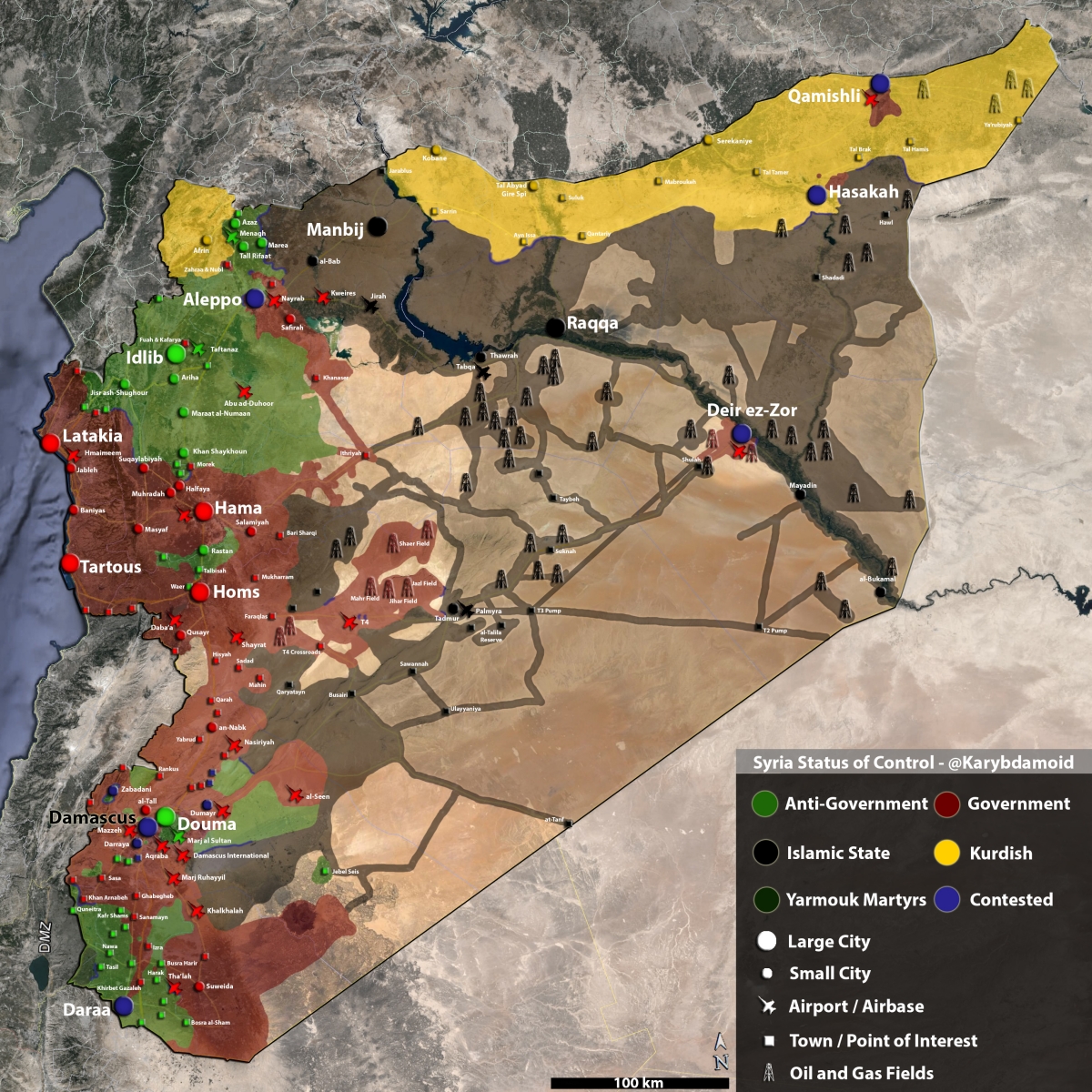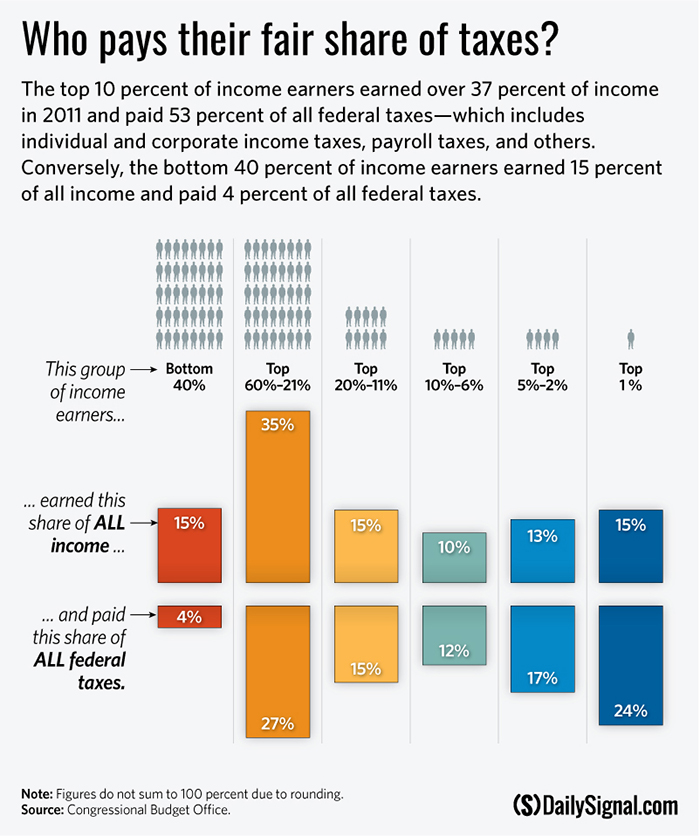320 Years of History
Gold Member
- Thread starter
- #21
Now let's look at what he's shared...consistently, what he's shared either defies everything that's well understood and proven or just isn't explained at all.
Anyone having the most basic background in economics will understand that import tariffs and quotas (protections) necessarily drive prices up. They do this in multiple of ways.
As if the wealthy don't already pay the majority of individual income taxes collected and therefore have every right to exert control and influence over policy.
Here's a 2011 breakdown by income percentage rank.
Compare that with the taxes paid prior to Mr. Obama's adjustments to the tax code.
Trump's boosting the tax burden on the wealthy won't affect wealthy people's lifestyles, but it will increase our justification for the levels of influence beyond that which we already have in policy making. I know I don't personally mind paying more in taxes if that's what I'm required to do, even 15% more, but I want something more in return for doing so, and that something is a greater say in public policy. Why is that what I'd demand in return? Because nothing of what the government directly spends its money on comes my way in proportion to the taxes I pay. I don't get more national defense than anyone else; I don't get better roads than do others; I don't get more access to goods/services than do other folks; and I certainly don't get individual subsidies.
Yet, what is one of the themes Donald Trump has been pushing? Removing the influence of the wealthy in government policy making. One thing folks like Trump conveniently don't mention is that wealthy people aren't limited to being citizens of the U.S. Most well off folks can very easily immigrate to "friendlier" nations; every one of us "brings something to the table" that will make other nations more than happy to approve our applications for citizenship, and it's not at all hard to find places that have equal or lower individual tax rates on wealth. One can go near or far to find stable nations that are quite amenable to having more wealthy people:
Sidebar:
Oh, that'll do wonders for the U.S.' credit rating. I suppose it's not occurred to Trump that the only thing backing U.S. debt is the "full faith and credit" of the U.S. government's ability and willingness to pay its debts. If folks think their dollar doesn't go far now, just wait and see how far it'll go when the U.S. simply says, "Sorry. We just can't and won't pay our debts." It's also worth noting that merely printing dollars also makes things worse.
Who knows? Well, seeing as we clearly don't, and Trump hasn't shown that he does, a rational conclusion is that nobody knows.
Okay. Fine. Close loopholes and tax wealthy people more than they are now. Nothing else? Really? On taxes, something that's foremost in the minds of many citizens? Is the tax code really that acceptable to him other than the loopholes and the rates paid by the wealthy? Not one word on corporate tax subsidies? Really?
Who knows is right. Again, such an absence of specific direction given on a topic that is very important in a nation that's already at the start of the biggest boom ever seen in the population of citizens who are of an age whereby they are most in need of healthcare? Really?
He's been capable of making private party deals. Making deals on behalf of a nation is a very different matter. Sure, some of the negotiating skills he's developed will transfer, but actually knowing and respecting the culture of the people with whom one sits at the table is also critical in international public policy negotiations. Has the man shown much if any regard for those folks? Not a bit that I've observed. Accordingly, why would they even come to the negotiating table? Especially if they know that if they don't give us what we want, we'll just leave the table, thereby insulting them and poisoning the well against future opportunities.
Economically speaking, one must remember that the U.S. is no longer the world's largest growth economy although it is the world's largest mature economy. So ask yourself, where are gains greatest, in a growing or already mature economy? The fact of the matter is that while nobody deliberately wants to "kill their cash cow," the fact is that they can and will if the new calves offer sufficient promise. With populations over triple that of the U.S. China and India won't really need the U.S. as a trading partner for long. They will for the next four years, yes, but do you really want a President who "screws the pooch" for the long term? I don't.
LOL
In closing, when it comes to articulating ideas, when a candidate does so, voters should use them to critically assess their readiness to be President. So, yes, I'm glad that Trump has said what he has. It's more than enough for me to be able to tell that he's not at all ready. On the other hand, Mrs. Clinton and Mr. Sanders have provided levels of detail that at least assure me they have step one covered: they actually do have a pretty comprehensive understanding of the situation the U.S. faces. In some cases, they even have policy approaches that I can see as plausibly working, even if they aren't necessarily the policy approaches I'd try first were it my decision to make. So when I get down to it what choice am I left with as a rational voter? I'm left deciding between:
Economic policy- general direction is China and Mexico are playing unfairly, and beating us. His solution, tariffs on China and Mexico or whoever.
Anyone having the most basic background in economics will understand that import tariffs and quotas (protections) necessarily drive prices up. They do this in multiple of ways.
- Short video explaining tariffs and quota and their impacts
- Short paper explaining them in a bit more detail
- Short paper explaining when it's appropriate to use a tariff vs. use a quota
- Short paper explaining when nascent industries should be protected
- If he were to actually do so, would there be a good reason to oppose his idea of imposing tariffs/quotas? No.
- Has Trump done so? No.
- Has Trump cited the research others have done that show the gains outweigh the downsides? No.
- Does Trump have a B.S. in economics thereby making it reasonable that we voters would expect him to know that the calculus noted above is what he should do to make the case for tariffs/quotas? Yes.
- Is a B.S. in economics enough training for one to credibly perform the calculus noted above? No.
- Have multiple researchers (professional economists) examined the specific and measurable impact(s) of tariffs/quotas and their consequences on various industries? Yes.
- Sugar industry
- Dialectically objective analysis of the impact of NAFTA
- The Effects of Protection on Domestic Output
"Evidence from the ITC and our econometric analysis of the relationship between trade barriers and domestic output in five industries lend support to the proposition that protection is not an effective means of stimulating domestic output."
Solution for national debt: wealth tax on the wealthy, something around a 14% haircut out of their bank accounts.
As if the wealthy don't already pay the majority of individual income taxes collected and therefore have every right to exert control and influence over policy.
Here's a 2011 breakdown by income percentage rank.
Compare that with the taxes paid prior to Mr. Obama's adjustments to the tax code.
Trump's boosting the tax burden on the wealthy won't affect wealthy people's lifestyles, but it will increase our justification for the levels of influence beyond that which we already have in policy making. I know I don't personally mind paying more in taxes if that's what I'm required to do, even 15% more, but I want something more in return for doing so, and that something is a greater say in public policy. Why is that what I'd demand in return? Because nothing of what the government directly spends its money on comes my way in proportion to the taxes I pay. I don't get more national defense than anyone else; I don't get better roads than do others; I don't get more access to goods/services than do other folks; and I certainly don't get individual subsidies.
Yet, what is one of the themes Donald Trump has been pushing? Removing the influence of the wealthy in government policy making. One thing folks like Trump conveniently don't mention is that wealthy people aren't limited to being citizens of the U.S. Most well off folks can very easily immigrate to "friendlier" nations; every one of us "brings something to the table" that will make other nations more than happy to approve our applications for citizenship, and it's not at all hard to find places that have equal or lower individual tax rates on wealth. One can go near or far to find stable nations that are quite amenable to having more wealthy people:
- Canada
- Luxembourg
- Singapore
- UAE
- Qatar
- Russia
- Monaco (zero income tax)
Sidebar:
I can speak only for myself, but I know I'm quickly approaching the point where I am sick and tired of the attitude in the U.S. that those of us who have done exactly what we were told would yield success -- go to school, do well, work hard, live within your means, get promoted, save/invest your money to provide for yourself and your family, etc. -- and now we are expected to feel bad for having done so, so bad that we also should not have the levels of political influence we do and now and that we also should have to pay even more to make up for the fact that others quite simply made choices that have shown themselves to be poor ones.
I'm not "crying poor" or "woe is me," and I'm not saying I'm unwilling to pay more in taxes. I am saying that asking folks like me to pay even more in taxes and expecting that we get nothing more in return for doing so, and expecting us to just "suck up" the castigation and disdain levied in our direction merely because we enjoy financial success just doesn't sit well at all with me. I'm just saying rich or poor, we need to be both rational and fair, to everyone, not just folks who for whatever reason haven't "made it."
End of sidebar.I'm not "crying poor" or "woe is me," and I'm not saying I'm unwilling to pay more in taxes. I am saying that asking folks like me to pay even more in taxes and expecting that we get nothing more in return for doing so, and expecting us to just "suck up" the castigation and disdain levied in our direction merely because we enjoy financial success just doesn't sit well at all with me. I'm just saying rich or poor, we need to be both rational and fair, to everyone, not just folks who for whatever reason haven't "made it."
Also he wants to solve our debt problem like he solved his own, which is essentially through brankruptcy [sic], pay some and then say we can't pay the rest so sorry (yes he did in fact suggest this yesterday).
Oh, that'll do wonders for the U.S.' credit rating. I suppose it's not occurred to Trump that the only thing backing U.S. debt is the "full faith and credit" of the U.S. government's ability and willingness to pay its debts. If folks think their dollar doesn't go far now, just wait and see how far it'll go when the U.S. simply says, "Sorry. We just can't and won't pay our debts." It's also worth noting that merely printing dollars also makes things worse.
On keeping business in the US: essentially make them stay, not much detail on that, so it could be by force, could be through individual tariffs, denying access to the economy, who knows. [sic]
Who knows? Well, seeing as we clearly don't, and Trump hasn't shown that he does, a rational conclusion is that nobody knows.
Tax plan: hasn't spoken much on this subject outside of wealth tax, and closing up loopholes.
Okay. Fine. Close loopholes and tax wealthy people more than they are now. Nothing else? Really? On taxes, something that's foremost in the minds of many citizens? Is the tax code really that acceptable to him other than the loopholes and the rates paid by the wealthy? Not one word on corporate tax subsidies? Really?
Healthcare- He is still for universal healthcare. But suggested once in a debate to do away with limiting insurances to their own state. So who knows what he really wants to do
Who knows is right. Again, such an absence of specific direction given on a topic that is very important in a nation that's already at the start of the biggest boom ever seen in the population of citizens who are of an age whereby they are most in need of healthcare? Really?
Foriegn [sic]- Hes a deal maker and will make deals with everyone, since he deals with Russia and China currently.
He's been capable of making private party deals. Making deals on behalf of a nation is a very different matter. Sure, some of the negotiating skills he's developed will transfer, but actually knowing and respecting the culture of the people with whom one sits at the table is also critical in international public policy negotiations. Has the man shown much if any regard for those folks? Not a bit that I've observed. Accordingly, why would they even come to the negotiating table? Especially if they know that if they don't give us what we want, we'll just leave the table, thereby insulting them and poisoning the well against future opportunities.
Economically speaking, one must remember that the U.S. is no longer the world's largest growth economy although it is the world's largest mature economy. So ask yourself, where are gains greatest, in a growing or already mature economy? The fact of the matter is that while nobody deliberately wants to "kill their cash cow," the fact is that they can and will if the new calves offer sufficient promise. With populations over triple that of the U.S. China and India won't really need the U.S. as a trading partner for long. They will for the next four years, yes, but do you really want a President who "screws the pooch" for the long term? I don't.
Isis, he will bomb the bleep out of them, he will take the oil fields they control, and claim them for the US.
LOL
- Bomb the bejesus out of them? Where? Inside counties on which we otherwise have not declared war and in which we have no rights to bomb at will? ISIS is not a nation; it is an organization comprised of individuals who have no means to mount a full on war, but who, like anyone, can commit individual acts of terrorism. Bombing them will kill some of ISIS' members, but the ideology is what needs to be crushed, and bombs don't destroy ideas and beliefs; if anything, they may bolster them.
Moreover, look where ISIS members work and train. Just Google some photos. When you look at them, you tell me what good a bomb will do. I'll tell you now what it'll do: it'll put craters in places that people travel through on foot and with mules and horses, so those people, ISIS, will have to stroll into and back out of the craters. Some of the places already have craters. What are our bombs going to do? Make them bigger? Yes, that'll help because there's so much critical infrastructure there that'll be sorely missed if it is destroyed by bombs. Not! Trust me, folks have long known how to dig holes and tunnels underground to avoid the devastation of bombing.



- Take the oil fields they control? They don't control any oil fields outside of Syria.

So let's say we (or someone) bombs Syria's oil fields that ISIS have coopted. Let's say too that we manage to oust the current regime in Syria. Then what? We will have created yet another Middle Eastern state in which there's a leadership vacuum and that has lost its principal means of generating revenue. We already know where that leads and we don't routinely profess not to like it.
In closing, when it comes to articulating ideas, when a candidate does so, voters should use them to critically assess their readiness to be President. So, yes, I'm glad that Trump has said what he has. It's more than enough for me to be able to tell that he's not at all ready. On the other hand, Mrs. Clinton and Mr. Sanders have provided levels of detail that at least assure me they have step one covered: they actually do have a pretty comprehensive understanding of the situation the U.S. faces. In some cases, they even have policy approaches that I can see as plausibly working, even if they aren't necessarily the policy approaches I'd try first were it my decision to make. So when I get down to it what choice am I left with as a rational voter? I'm left deciding between:
- So-called policy approaches that I can already tell are hollow, ill informed, or just outright misguided, versus...
- Policy approaches that may or may not work, but that I can at least tell have some chance of working.




